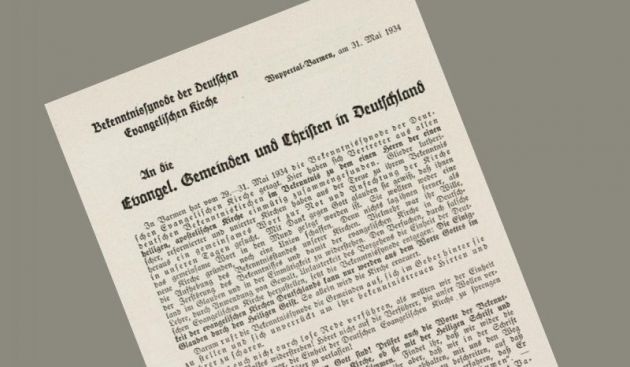German church declaration rejecting Nazi policy remains an inspiration, says WCC head

The head of the World Council of Churches has praised the Barmen Declaration, in which members of Germany's Confessing Church condemned Nazi incursions in church life 90 years after it was signed.
In a message to the Evangelical Church in Germany (EKD), WCC general secretary Rev. Jerry Pillay stated that the declaration has helped Christians since 1934 to combat oppression and injustice.
"The Barmen Declaration has served as an inspiration to Christians facing tyranny, injustice, and discrimination of the need for the church to reject the claims of oppressive regimes and to combat heretical tendencies within its own ranks," said Pillay.
The declaration was issued on the last day of a church synod that met in Barmen, a district of the city of Wuppertal in Germany's Rhineland, from May 29 to 31.
It was an appeal to Protestants to reject the policies of the so-called "German Christians" who supported National Socialism and its policies in church life.
"Precisely because we want to be and to remain faithful to our various confessions, we may not keep silent, since we believe that we have been given a common message to utter in a time of common need and temptation," the synod stated in its declaration.
"We are bound together by the confession of the one Lord of the one, holy, catholic, and apostolic church," it affirmed.
Pillay, who comes from South Africa, recalled how the Barmen Declaration helped inspire theological resistance to the racist policy of apartheid in his country.
This also found expression in the Kairos Document of 1985 in South Africa, whose anniversary the WCC will commemorate in 2025 when its central committee, its main governing body between its assemblies meets in Johannesburg.
The Barmen Declaration, Pillay said, was a "truly ecumenical event," since it was the first common statement by representatives of Lutheran, Reformed, and United churches in Germany since the time of the Reformation.
"Today, the Barmen Theological Declaration reminds us of the inextricable link between the search for the unity of the church and the need for a common message on the basis of our faith against tyranny, war, and injustice," Pillay wrote.
His letter was sent to Bishop Petra Bosse-Huber, head of the EKD's Department for Ecumenical Relations and Ministries Abroad.